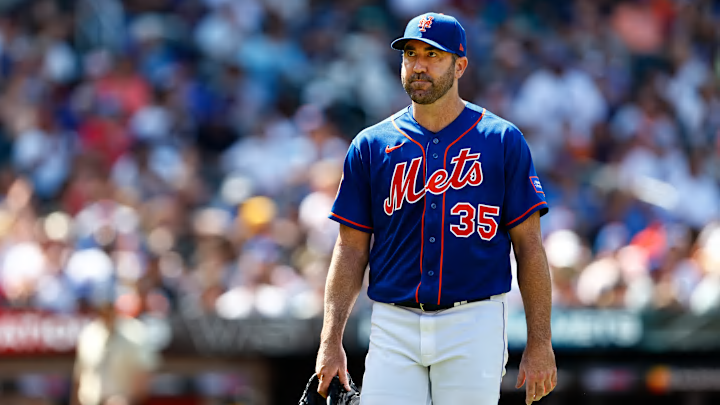Unless the New York Mets didn't believe in the Los Angeles Dodgers' prospects, it's difficult to understand why Andrew Friedman and the front office didn't come closer to landing Justin Verlander in a trade before Tuesday's deadline.
Instead, the star right-hander went back to the Houston Astros with hours to spare. For a moment there, it looked like the Dodgers were smart to keep the Mets at arms length, but as the details later poured out, it became evident LA should've been there until the very end.
Again, maybe they were, but it was certainly a gradual shift in the Astros direction for what felt like the better part of the last 24 hours, so it seems everything broke down much sooner than we might've realized.
Heading to New York are two outfield prospects in Drew Gilbert and Ryan Clifford, the Astros' Nos. 1 and 4 overall prospects, per MLB.com. Heading to the Astros is Verlander and a pile of cash, which should've coaxed the Dodgers to move forward with this.
The Mets are covering $54 million of Verlander's remaining $93 million on his contract (assuming his $35 million vesting option for 2025 kicks in if he pitches at least 140 innings next year). That means the Astros will be paying mid-rotation money to one of the best arms in the game. They would owe him $39 million through 2025. Bob Nightengale is reporting $29 million but, using math, it sure seems like 39 is the number.
The Astros were very reticent to part with Ryan Clifford, and it's easy to see why: He's already raking at High-A after going to them in the 11th round last year. Just turned 20 within the last two weeks. A number of evaluators see him as a superior prospect to Drew Gilbert.
— Jeff Passan (@JeffPassan) August 1, 2023
Why weren't Dodgers willing to battle Astros for Justin Verlander trade?
It's quite possible LA didn't align with New York's needs, which should be the only reason why this didn't end up happening. LA's top position player prospects -- Diego Cartaya and Dalton Rushing -- are catchers, which the Mets don't need. New York more than likely had no interest in Michael Busch, who's already 25 years old, either.
It also didn't seem like the Mets wanted pitching. At all. They got two outfielders for Verlander, one pitcher in their Mark Canha trade with the Brewers, and one position player (Ronald Acuña's brother) in their deal with the Rangers for Max Scherzer.
If that was indeed the case, then the Dodgers definitely weren't a match for them. Or maybe the Mets were trying to get them to take on more money if LA didn't have what they were asking for?
Based on a reported $54M retained, it appears that the #Astros will acquire Justin Verlander for $0 in 2023, and around $3M for the 2024 season.
— Spotrac (@spotrac) August 1, 2023
Also, should MLB just start adopting transfer fees like international soccer leagues? That's essentially what's happening here.
It is worrisome, howerver, that MLB.com's Juan Toribio reported the Dodgers' pursuit of Verlander was complicated by "his age, contract length, and money owed" on the contract. What's wrong with Verlander's age? He's still one of the best pitchers in the game without question. What's the problem with the length of his contract? Worst-case scenario he's signed through 2025 at a discount? And the money? The Mets were clearly willing to cover a majority of it if they received what they asked for.
The #Dodgers had interest in Justin Verlander, but the combination of his age, contract length, and money owed made a deal with the Mets difficult. He’s going to the Astros, per source, as others have reported.
— Jorge Castillo (@jorgecastillo) August 1, 2023
Eduardo Rodriguez remains an option for the Dodgers.
Who would've been off limits here? Bobby Miller and maybe that's it? Verlander elevates your pitching staff, makes you a more attractive destination, and doesn't carry a burdensome contract under these terms. Seems like a win-win-win for an offseason Shohei Ohtani pursuit.
By no means are we assuming the worst, but a few tidbits to clarify what had happened sure would be helpful.
